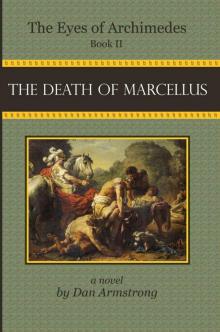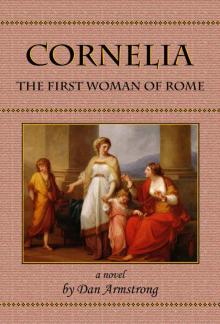- Home
- Dan Armstrong
Cornelia- the First Woman of Rome
Cornelia- the First Woman of Rome Read online
CORNELIA
Other Books by Dan Armstrong
Taming the Dragon
Prairie Fire
Puddle of Love
The Open Secret
Chain of Souls
The Eyes of Archimedes Book I
The Siege of Syracuse
The Eyes of Archimedes Book II
The Death of Marcellus
The Eyes of Archimedes Book III
Zama
CORNELIA
The First Woman of Rome
A Novel
Dan Armstrong
Mud City Press
Eugene, Oregon
Cornelia: The First Woman of Rome
Copyright © 2017 by Dan Armstrong
All rights reserved. No part of this book may be used or reproduced by any means, graphic, electronic, or mechanical, including photocopying, recording, taping or by any information storage retrieval system without written permission of the publisher except in the case of brief quotations embodied in critical articles or reviews.
Published by
Mud City Press
http://www.mudcitypress.com
Eugene, Oregon
This is a work of fiction. Names, characters, places, and incidents are either the product of the author’s imagination or are used fictitiously.
The image on the book’s cover comes from the Wikipedia Commons. The original is a painting by the Swiss artist Angelica Kauffman (1741-1807) titled “Cornelia, Mother of the Gracchi.” The image on the back is also from the commons. The artist is unknown.
ISBN-978-0-9993219-0-4
Printed in the United States
To Judith
AUTHOR’S NOTE
The episode in Roman history described in this novel takes place between the years 136 B.C. and 121 B.C. and represents a critical, but rarely discussed, period in the evolution of the Roman Republic. The Republic was first established in 509 B.C. Rome at that time was governed by a senate populated exclusively by members of the Roman aristocracy (the patricians). Over the next three hundred and sixty years, this early plutocracy begrudgingly transformed, one law at a time, into an increasingly democratic system, though the upper class always maintained a firm grip on the levers of power.
Cornelia: The First Woman of Rome follows the lives of the Gracchi family—Cornelia Scipionis and her three children Tiberius, Gaius, and Sempronia. Over a fifteen-year period, Tiberius and Gaius were central players in Roman politics and installed a series of laws designed to give the common citizen (the plebeians) a larger part in the process of governance. Unfortunately, the progressive politics of the Gracchi led to an unexpected turn away from civility in Roman discourse, and despite the goodwill of the brothers, marked the beginning of a tumultuous one hundred-year devolution of the Roman Republic into an empire. The story of the Gracchi family is one of the lesser told chapters in the history of ancient Rome, though it might also be one of the most telling. At the very least, it is an important cautionary tale for all aspiring democratic nations and merits repeating.
*
The many Latin, Greek, and other foreign names used for the characters in this novel are listed alphabetically at the back of the book for the reader’s convenience. In addition, a family tree located before the prologue provides the ancestry of the central characters in the story. A glossary containing words specific to ancient Roman culture follows the list of characters.
Although a concerted effort has been made to be faithful to a very complex episode in the history of Rome, simplifications were made for the sake of readability. In the end, this is a novel. The story is an embellishment of the existing literature.
“A woman, serious
about future and past,
I peruse Greek scrolls,
weave Latin wool and toughness.
But I never asked for heroes.
Some jewels would have been enough.
In my salon I thought and spoke
poetry only till politics took over.”
-Susanna Roxman, from poem Cornelia
Western Mediterranean
The City of Rome
Cornelian/Gracchan Family Tree
PROLOGUE
I, Sempronia Gracchae, daughter of Tiberius Sempronius Gracchus and granddaughter of Publius Cornelius Scipio Africanus, can now say I have witnessed the first few steps in the collapse of the Roman Republic. After nearly four hundred years, the most stable democracy in the world has succumbed to thuggery, undisguised corruption, and demagoguery. I no longer recognize the society in which I live. The situation so grieves me, that even though I am a woman and my opinion counts for little, I feel compelled to write a history of this demise, a demise that broke the heart of the most respected woman in Rome, my mother Cornelia Scipionis Africana, and would bring tears of rage and anguish to my ancestors. While the heroes of my story are surely my brothers, Gaius and Tiberius, my mother provided the foundation upon which their characters and intellects were allowed to flourish. For me, all begins and ends with this woman. I write to bare my soul in hopes of relieving hers.
Life in Rome changed dramatically in the years after my grandfather defeated Hannibal. Rome became the dominant nation in the world. Ambitious Roman consuls found reasons for military campaigns anywhere treasure might be plundered and humans shackled. Armies were dispatched throughout the Mediterranean region and into Gaul making one conquest after another. Wealth flowed into Italy by the boatload—gold, silver, artwork of all varieties, and tens of thousands of slaves. What had once been a nation of farmers, a people who prided themselves on hard work and austerity, transformed into a culture of excess and financial extremes. The rich had more and the common citizens less.
My grandfather saw the beginning of this. He became so cynical that he quit the Senate ten years after his triumphant return from Africa to live out the remainder of his life in isolation. The story of what happened in Rome afterward can best be told through the life of his daughter, my mother Cornelia, as elevated and capable a woman as her father was a man. She is nearly seventy-five years old now. She and I, two widows who never remarried, share her villa in Misenum. I have yet to show her what I am writing, but I have only just begun.
As the daughter of Scipio Africanus and Aemilia Tertia Paulla, Cornelia was born into the highest ranks of the Roman aristocracy. Her father and mother emphasized education, particularly the study of Greek literature and philosophy. Although Africanus died when Cornelia was seven, Aemilia provided Cornelia with world-class tutors and access to Rome’s best private libraries. At a young age Cornelia possessed a worldliness gained through education and her social milieu entirely unknown among Roman women.
At seventeen she married my father, Tiberius Gracchus, then forty-five. He was from the plebeian class but of the highest character, twice a consul, once a tribune of the plebs, and once a censor. Though Africanus and Tiberius were never friends, Tiberius gained the family’s favor when, as a tribune, he twice vetoed Porcius Cato’s legal attacks against my grandfather and his brother Lucius. Those vetoes earned him the valuable prize of my mother’s hand in marriage.
Cornelia came with the unheard of dowry of fifty talents of silver and her patrician name. Despite the age difference, Tiberius was a good match for her, and my parents loved each other in a way that was uncommon among arranged marriages. They had twelve children in their eighteen years together, but only three lived past the age of five.
I was the first surviving child. I was born with a twisted ankle, called by some a clubfoot. Female newborns, especially the second or third in a family, are often left out to die in Roman culture. It is the same for a male child born with a deformity. After losing three chil
dren in thirty-six months, and my brothers not yet born, my mother, perhaps concerned she would not bear another living child, went against all social norms and nursed me through my early months despite my being both female and deformed.
My father was on a campaign in Cisalpine Gaul at the time. He never knew about my ankle. Cornelia wrapped my foot every day from the moment I was born, gradually straightening and strengthening it. By the time I was a youth, I could walk without a limp. Hidden beneath the hem of my stola, my twisted foot was never noticed or mentioned—not even to the man to whom I was promised, my cousin by adoption, Publius Cornelius Scipio Aemilianus.
My father died of an illness when I was sixteen. My brother Tiberius was nine. Gaius, my mother’s third surviving child, had just been born. I was married the following year.
My ankle, which I had learned to endure in my early years, began to ache when I passed the age of thirty. Walking with any kind of grace became increasingly difficult. My husband, Aemilianus, could not help but notice. An overly proud and critical man, he felt my imperfect gait reflected badly on him. That my four pregnancies had not produced a surviving child only added to our troubled relationship. The situation became so trying that I began to believe my mother had made a mistake allowing me to live. In moments of weakness I would recall what she had told me when I was nine and first asked about her decision to nurture me when I was an infant.
“Your body was not perfect, Sempronia,” she said, “but I never doubted the clarity of your mind. I saw it in your eyes right away. My mother granted me the gift of education, and I wanted a daughter of my own to educate and with whom to share my fondness for literature and art. You are that lovely girl.”
Yes, this sweet memory provided me with strength, but it was one thing for my mother to educate my brothers for an active life of military service and politics and another to educate me. Why educate a woman when she will have no duties other than managing her house slaves? There is, of course, the appreciation of knowledge for the mere beauty of it. Which is surely something in itself; a form of wisdom as Cornelia would say. But education also inspires—and empowers—and a woman with ideas can be a problem if she has nothing to do. So now, after fifty-five years of unanswered promise, I have decided to write this history.
The events I chronicle occurred over a period of fifteen years, beginning twenty years ago when Cornelia was fifty-four years of age and her reputation was at its greatest. I was present in Rome for almost all of those fifteen years, but much of what I describe came to me secondhand through interviews and casual conversations. Because of the prestige of my husband and my mother, I had access to almost all the important players in my story, sometimes through close familial ties, sometimes during social gatherings, sometimes when my sources had too much to drink. In a few instances, I have expanded one or two key pieces of information into dramatic scenes far beyond what I might reasonably know. If you feel my imagination or my unabashed bias compromises a history’s need for accuracy and objectivity, please forgive me. What was it the Greek playwright Menander said? “Teaching a woman to write is like providing poison to an asp.” Should any members of the Roman Senate read this book, I suspect they will say I have proven Menander right. I offer only one excuse; confessing to murder is never easy, as many of those same senators might also attest.
PART I
TIBERIUS
“The plebeians and Senate of Rome were often at strife with each other concerning the enactment of laws, the cancelling of debts, the division of lands, or the election of magistrates. Internal discord did not, however, bring them to blows; there were dissensions and contests within the limits of the law, which they composed by making mutual concessions, and with much respect for each other.”
-Appian of Alexandria, Civil Wars
CHAPTER 1
My history begins at a time when I still believed in the gods. My brother Tiberius had just returned from military duty in northern Spain. He was twenty-seven and had already shown the promise of his heritage. I had a dinner for him at my home on the east side of the Palatine Hill. It was just family. Tiberius, my brother Gaius, my husband Aemilianus, and Tiberius’ recently widowed father-in-law, Appius Claudius Pulcher, reclined on couches on three sides of the table. My mother Cornelia, Tiberius’ wife Claudia Pulcheria, and I sat in chairs opposite the men. Gaius had just turned seventeen. I was thirty-four.
The dinner was a celebration. Tiberius had accounted well for himself during what had been a difficult campaign in Numantia, serving as the quaestor for the current consul Gaius Hostilius Mancinus. Rome was all abuzz with several versions of what had happened—not all of which were good. We were anxious to get it directly from Tiberius, but no one more so than Aemilianus, arguably the most powerful man in Rome at the time, both in wealth and political influence.
The meal began with a tray of olives and another of oysters and prawns sprinkled with cumin. The men drank wine from Apulia. Claudia, Cornelia, and I drank posca, apple cider vinegar diluted with water.
Tiberius was in good spirits and, much like my mother, maintained an assured composure when he spoke, projecting confidence without conceit. Even on this evening, when relating the events in Numantia that had catapulted him into the public eye, his manner was calm and thoughtful. “We struggled in combat with the Numantines from the moment we arrived. I wouldn’t fault Mancinus. It just seemed that everything that could go wrong did.”
Aemilianus, who had already heard some of the early reports, lounged stoically at the head of the table. Of all of us, only he was not outwardly enjoying the evening.
“Toward the end of the summer,” continued Tiberius, “we were beaten badly east of the Duero River, not far from Numantia. Mancinus felt the campaign was in danger of becoming a complete failure and evacuated our camp in the middle of the night, leaving much of our baggage behind.” Tiberius was a handsome man with curly brown hair, a clean-shaven face, and deep, penetrating brown eyes. He shook his head recalling the situation. “Their scouts saw us leaving. They looted our camp in the morning then put two separate armies on our tail. By noon they were attacking the rear of our train.
“A lot of men were lost, as well as what little baggage we had with us. Combining these attacks with artful maneuvering, the Numantines pinned us into a small valley. Mancinus saw, as every one of us did, that we had little hope of escape. He sent his legates to the Numantine leaders with the intention of negotiating a truce.”
“You mean a surrender,” said Aemilianus soberly.
Tiberius nodded. “It was either that or having twenty thousand legionnaires surrounded and slaughtered. But their leaders rejected Mancinus’ envoys, saying they would only speak to me—because several of them had known our father.” He glanced at Gaius and me. “He had shown the Numantines leniency twenty years earlier.”
Cornelia smiled at this. “So you became the mediator, Tiberius?”
“Yes, Mother, they trusted me. That’s what made the settlement possible. But once we had begun our march back to Italy, I realized that the ledgers I kept as part of my duty as quaestor had been left behind in our camp. Knowing they would be important for documenting what had happened, my friend Laetorius and I rode back to Numantia to see if we could recover the books. Although we were uncertain how this request would be received, we were welcomed at the gate. They returned the ledgers and asked if there were anything else I might want that had been lost. Eager to return to our troops, we asked for nothing more, but when we began to leave, they invited us to a feast with their leaders. Not wanting to insult them, we stayed for the meal, where again they spoke of our father with the highest praise.”
Again this pleased Cornelia. “It’s always been my desire that you and your brother would follow his example. It seems that you have, Tiberius.” She turned to my younger brother. “And I have no doubt that Gaius will as well.”
Aemilianus, a resolutely serious man with a narrow, hawk-like face, sat up from his reclining position. He had said
little all evening and had let the rest of us dominate the conversation, but he clearly had something to say now. “Do you believe this is something to be proud of, Tiberius? Surrendering to barbarians?”
“Proud of, sir? No, but we saved the lives of some twenty thousand Romans.”
“Twenty thousand men, but they weren’t Romans. They were cowards. The reputation of our military is sullied when we openly surrender to uncivilized peoples like the Numantines.” He glanced at Gaius to make sure the young man understood, then looked directly at Tiberius. “The review will be tomorrow. The entire thing will be judged dishonorable. Expect the senators to annul your treaty. If they follow precedent, Mancinius and some, if not all, of his officers are likely to be sent back to Numantia as prisoners of war.”
Tiberius’ wife Claudia visibly paled. Her father, a high-ranking senator and a noted member of the populares, the progressive faction in Roman politics, nodded. “Yes, I’m afraid Aemilianus is right.”
Tiberius already knew this was true. The review would be difficult, and he would have to testify.
Cornelia spoke up. “You mean Tiberius could be sent back to Numantia as a prisoner?”
Aemilianus treated no other woman with the respect he gave my mother. She was his aunt and a few years his senior. He had known her all of his life and had done everything for our family after my father’s death. “It’s possible, Cornelia.”

 The Death of Marcellus
The Death of Marcellus The Siege of Syracuse
The Siege of Syracuse Cornelia- the First Woman of Rome
Cornelia- the First Woman of Rome Zama
Zama